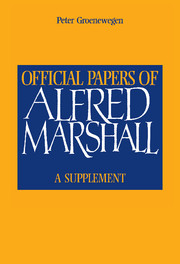Book contents
- Frontmatter
- Contents
- Preface and acknowledgements
- General introduction
- ITEM 1 Evidence to the Committee Appointed to Inquire into the Condition of Intermediate and Higher Education in Wales and Monmouthshire by Alfred Marshall, given at Newport, 20 December 1880
- ITEM 2 Gold and Silver Commission: note by Professor Marshall on Professor Nicholson's paper ‘On the Effects of a Fall in the Gold Price of Silver and General Gold Prices’ (dated 30 June 1888)
- ITEM 3 Material associated with Marshall's work for the Royal Commission on Labour 1891–1894
- ITEM 4 Appendix: Treasury document: ‘The Fiscal Problem’, 25 August 1903
- Index
General introduction
Published online by Cambridge University Press: 04 August 2010
- Frontmatter
- Contents
- Preface and acknowledgements
- General introduction
- ITEM 1 Evidence to the Committee Appointed to Inquire into the Condition of Intermediate and Higher Education in Wales and Monmouthshire by Alfred Marshall, given at Newport, 20 December 1880
- ITEM 2 Gold and Silver Commission: note by Professor Marshall on Professor Nicholson's paper ‘On the Effects of a Fall in the Gold Price of Silver and General Gold Prices’ (dated 30 June 1888)
- ITEM 3 Material associated with Marshall's work for the Royal Commission on Labour 1891–1894
- ITEM 4 Appendix: Treasury document: ‘The Fiscal Problem’, 25 August 1903
- Index
Summary
When Keynes edited the Official Papers of Alfred Marshall, he claimed that the volume contained ‘the whole of Alfred Marshall's contributions to official inquiries on economic questions with the exception of his work on the Labour Commission’. Keynes explained the reason for this omission as follows. Because Marshall was a member of this Commission and not a witness, ‘it was impossible in this case to identify or separate his contributions from those of the Commission as a whole’. In this preface, Keynes was mistaken on various counts, in some respects, wittingly so.
While Keynes was still in the process of editing the material for publication, he was advised by two knowledgeable correspondents that the plan on which he was working was partly flawed. Professor T.E. Gregory wrote Keynes in September 1925 that some papers which Marshall had prepared for the Gold and Silver Commission had not been included in the printed Report. Two of these Keynes subsequently included. The first was a Memorandum on the Relation between the Fall of the Exchanges and Trade with Countries which have not a Gold Currency, dated 13 January 1888. Secondly, Keynes printed the preliminary Memorandum in which Marshall had answered a number of questions put by the Commission to academic and other experts. This was dated 9 November 1887. In between, Keynes inserted the transcript of Marshall's evidence over three days, and a further Memorandum prepared either late January or early February 1888.
- Type
- Chapter
- Information
- Official Papers of Alfred MarshallA Supplement, pp. 1 - 6Publisher: Cambridge University PressPrint publication year: 1996

